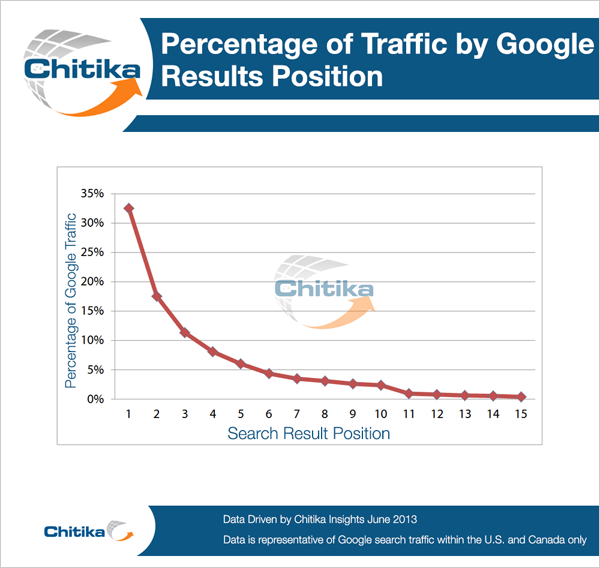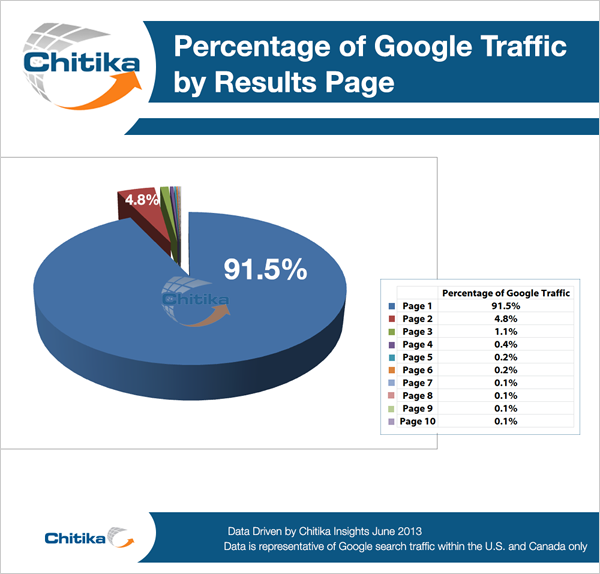How High Do You Need to Rank on Google?
 Studies show higher rankings earn significantly more traffic.
Studies show higher rankings earn significantly more traffic.If you’re somewhat knowledgeable about internet marketing, you’ve probably heard the acronym SEO, which stands for Search Engine Optimization. We’ve been touting the value of this highly effective and relatively low-cost marketing tool in our blog posts and newsletters for years.
So how important is achieving a high ranking on Google or other top search engines? Should your goal be the number one spot, or is number eight good enough? If people are really motivated, won’t they find you on page three?
According to a new study by Chitika, an online advertising network, your position in Google’s organic search rankings is even more critical than most realize. The company tracked ad impressions originating from Google to measure the true impact rankings have on website traffic. The difference in the top three search results says it all:
- 1st position – generates 33% of traffic per search
- 2nd position – generates 18% of traffic per search
- 3rd position – generates 11% of traffic per search
As you can see, being at the top of Google’s search result generates almost twice the traffic of the number two position. The same holds true for ranking number two and three. The traffic for each successive result drops 1-3%, until reaching a measly 2% of traffic by the bottom of the page:

And here’s the kicker: page one generates about 92% of the total traffic for any given search! That means most users never dig deeper than the first ten search results.
Can you guess what the traffic looks like on page two? As the chart below shows, that’s not where you want to be. By page three, you’re practically invisible. In fact, if Google had a promotion on page five to give away a million bucks, they’d never have to pay it because no one would know it’s there.

Don’t Take SEO Lightly
Studies by others marketers have shown similar results. Search Engine Watch recently shared a few examples, and this study by iCrossing (PDF) found that Yahoo and Bing also generate 95% of search traffic from the first page.
To make things more difficult, search engines no longer give organic search results the prominence they used to. Google crowds the page with paid advertising, local search results (whether you want it or not), maps and other bells and whistles. In fact, the top-ranked organic listing may appear halfway down the page.
With that kind of competition, few businesses can afford to take a casual approach to SEO.
Besides top rankings, you’ll need traffic from high-value prospects that you’re more likely to convert, so it’s equally important to rank for the right keywords and search terms and entice them to click. Beware of “black hat” tactics that only reap superficial, short-term results. An effective SEO program should address factors such as:
- Unique page titles
- Relevant and engaging meta descriptions
- Descriptive URLs, link text, alt tags and image names
- Valuable content that people actually want to read!
A great place to start is Google’s SEO Starter Guide (PDF), originally developed for Google’s own internal teams. But if you’d like to know how well your site currently ranks, plus get ideas and recommendations to improve your ranking, contact us for a free SEO analysis.
Pingback: What's New (and What Isn't) for Search Engine Optimization | Marketing Westchester NY | InSight Marketing of Westchester NY
Pingback: Google Changes AdWords Ranking: What You Need to Know | Marketing Westchester NY | InSight Marketing of Westchester NY